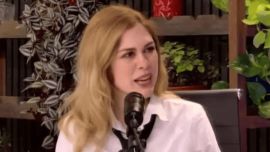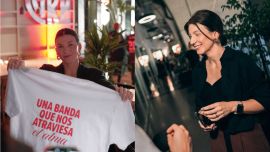My parents used to assure me, “It’s an ill wind that blows no good” but I never quite understood what the English proverb meant. I do now. The “ill wind” of Covid-19 that has blown through the world has surely brought some good with it. A case in point is the way in which the quarantine has kept us sheltering at home, forcing us to look not only within ourselves but also on the Internet to bring some pleasure to our restricted lives.
I think many people must have had a journey of discovery thanks to the quarantine. I have had many glorious awakenings to fascinating people, places and subjects while looking up the most prosaic things. I am currently embarked on such a voyage, which has brought joy to my life this week.
It began when I decided to research the term “virtual music,” which I had never heard of before. Virtual music is what musicians have embraced to counter the devastating blow to ”live music” that the “ill wind” has dealt to their world. But there is some good to be found in the “ill wind” even for musicians, who have been among the most deprived. Because of the closure of concert halls to audiences, a vast new space for musical performance has opened on the Internet.
I heard about a wonderful example of “virtual music” from a friend, the international concert pianist Enrique Graf, the founder of the Colonia de Sacramento International Festival of the Arts. Normally, he lives in Charleston, South Carolina, and winters in his native Uruguay. The time in between is spent travelling to play in concert halls throughout the world. Enrique brought to my attention the SONUS International Music Festival, which is extracting the good from the ill of the pandemic restrictions. (Sonus is derived from the Greek word for sound).
The SONUS Festival brings together 18 guest artists (including Enrique) under founder and artistic director Nancy Roldán to celebrate the work of Argentine composer Carlos Guastavino, on the 20th anniversary of his passing. They will be performing every night from October 22 through 28, at 8pm (New York), 9pm (Buenos Aires), streaming live on the SONUS YouTube Channel.
Learning about SONUS proved to be a joyous experience. I have long loved the music of Guastavino. The haunting melody and plaintive words of Se equivoco la Paloma have echoed in my mind for some 60 years since I first heard the Gómez Carrillo family’s extraordinary harmonisation. Think of the way the song was created: Rafael Alberti, fleeing from Spain, writes the poem in Paris while staying with Pablo Neruda. When he is exiled in Buenos Aires, Alberti meets the young composer Guastavino, who sets the poem to music. Then, Guastavino added at the end of each verse: se equivocaba. The repetition is deadly. The dove becomes unforgettably lodged in one’s memory.
The festival, which runs every night from Thursday, October 22, to Wednesday, October 28, brings together a diverse group of artists; unsurprisingly the majority of them are immigrants. It’s a glorious festival of nationalities and double nationalities, covering the continents of Europe, Asia and the Americas.
Writing about what it means to be an immigrant, Roldán describes herself as a “legal green card holder” who “adopted the USA as my home with all my love and admiration.” But the festival’s director, also speaks of her “soft spot for Argentina, the Argentina I remember from long ago … a country of immigrants, just like the United States” where she “grew up surrounded by immigrants, people who had fled their European homes because of World War II.”
Guastavino, who has been described by some as the “Schubert of the Pampas” may seem at first sight to be nationalistic. But, like many composers who draw on folklore and national and local themes, his compositions have universal appeal. His music captures the characteristics of Santa Fe Province while remaining in, yet also transcending, the romantic tradition.
He not merely eschewed modernism, represented by his contemporary, Alberto Ginastera, Guastavino detested it. In a delightfully revealing 1992 interview that I found on YouTube, he describes atonal music as “nasty … just a lot of noise.” Music, he said, is “melody, harmony and rhythm.”
May music, which, as Shakespeare noted, is the food of love, blow the good into the ill wind of Covid-19.
* Full details of the SONUS INTERNATIONAL MUSIC FESTIVAL programme can be found at www.sonusinternationalmusicfestival.org, or via the Sonus International Music Festival Facebook page.
























Comments